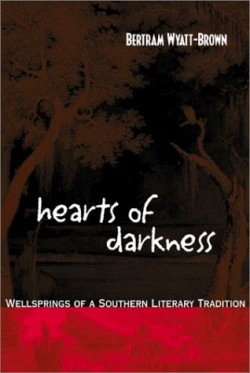Hearts of Darkness
Wellsprings of a Southern Literary Tradition
Southern writers have never had a monopoly on mental distress or journeys to the dark side, but they certainly have the pedigree. Southern literature of all types has long delved into despair, emotional unrest, and hauntings of inadequacy. This book is an intricately detailed history of Southern writers and the private demons that made them tick-and sometimes grind to a halt.
The author, a Southern historian and literary scholar, uses as his framework a collection of college lectures he has delivered on the ethic of honor, the tragedy of melancholy, and the personal origins of artistic imagination. These three themes emerged, closely intertwining, while he was doing research on the Southern family. He discusses writers like Edgar Allan Poe, Mark Twain, O. Henry, and Willa Cather, all of whom wade deeply into melancholy, despair, cynicism, and subversive humor in their own ways.
John Kennedy Toole, author of the award-winning A Confederacy of Dunces, a tale of an eccentric Southerner, committed suicide before getting the recognition he deserved. Toole was part of a tradition of Southern artists who, lacking a normal childhood, dealt with it through their writings. The work of writers with family trees going back before the Civil War sometimes dealt with the antebellum South and the gradual overshadowing of its traditions by the North. Defending personal or family honor was a theme they frequently addressed.
For many of these writers, losing a loved one or confronting tragedy was such a depressing experience that the only way they could work through the pain was to articulate it on paper. In Poe’s poem “The Raven,” for example, according to Wyatt-Brown, the large hovering bird represents the poet’s own melancholy.
This book is not light reading, neither in terms of subject matter nor style. It is intended as a scholarly work for academic eyes, with copious footnotes on every page referring to other scholarly works, obscure works of fiction by regional authors, or historical tracts.
The book is mercifully divided into chapters dealing with these mental maladies, so readers are not totally overwhelmed at one time. One section addresses the tightrope walked by antebellum male Southern poets. How could they balance chronicling their innermost feelings in verse while maintaining their stoic masculinity? Some handled it better than others. Poet Sidney Lanier, after a rough experience in a Civil War prison, endured only because of a strong family support network. O. Henry (William Sydney Porter), the North Carolina master of irony, could not control his finances as well as he handled his pen. Some of his writing career was spent in a federal prison in Ohio because of it.
Willa Cather, the native of the lush greenery of Virginia who migrated to the expansive, bleak plains of Nebraska, dealt with the shocking transition between these two landscapes in her novels. While she became known as a Great Plains writer, her upbringing in Virginia often found its way onto the page. “Removal from Virginia did not, of course, solely explain Cather’s complex, elegiac temperament,” Wyatt-Brown writes. “But certainly her deeply traditionalist side-distaste for emotional excess, self-confession, and sexual expressiveness-had roots in her upbringing under her parents in both Virginia and Nebraska.”
This book may not promote a stampede of readers to Southern fiction, but it will give sound guidance to anyone who chooses to plunge into these hearts of darkness.
Reviewed by
Karl Kunkel
Disclosure: This article is not an endorsement, but a review. The publisher of this book provided free copies of the book to have their book reviewed by a professional reviewer. No fee was paid by the publisher for this review. Foreword Reviews only recommends books that we love. Foreword Magazine, Inc. is disclosing this in accordance with the Federal Trade Commission’s 16 CFR, Part 255.

